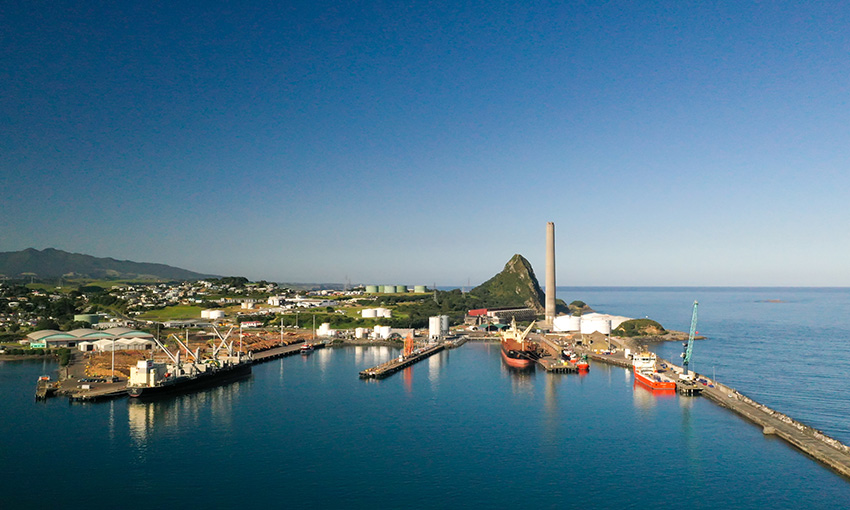PORT Taranaki has reported increases in profits for the year to 30 June despite a decrease in trade volumes.
The port said increased vessel visits and a rise in the volume of dry bulk trade across the wharves has helped Port Taranaki record a strong result for the 2021-22 financial year.
For the 12 months to 30 June 2022, the port reported net profit after tax of NZ$9.91 million, an 8% increase on NZ$9.18 million in 2021. Trade for the year was 4.74 million tonnes, down 356,000 tonnes, or 7%, on the previous year.
The port said this was predominantly the result of reduced bulk liquids trade, which was down 270,000 tonnes, or 9.1%, to 2.72 million tonnes.
However, helping offset the drop in bulk liquids trade was a 6.9% increase in dry bulk trade, from 766,000 tonnes to 819,000 tonnes.
Log trade at the was off the previous year’s record high of 1.14 million Japanese Agricultural Standard (JAS) to 1.11 million JAS – a drop of 1.9%. The log trade was impacted by a combination of the COVID-19 lockdown in the first quarter, and poor weather creating disruptions to ship visits in the last quarter.
Vessel calls up, revenues up
Despite overall trade being lower, vessel visits increased from 265 to 284 – the highest number of visits in the past seven years.
Revenue for the 2021-22 year was NZ$51.46 million, up 1.2% on the previous year, and was driven by the rise in dry bulk trade, the increase in vessel visits, and increased offshore support.
Port Taranaki chief executive Simon Craddock said the result was “very pleasing”.
“[The result] highlights the importance of the diversity of trade across the wharves, and the port’s ability to handle varying products and trade conditions,” he said.
“Enabling this has been the hard work and resilience of our people, who have continued to operate professionally in the COVID-19 environment, and who have worked hard to make trade as easy as possible for our customers.”
Taranaki oil and gas sector development
Mr Craddock said the drop in bulk liquids volumes was attributable to substantial development and maintenance work in the Taranaki oil and gas sector.
While this had restricted production in the past year, in the long term it would ultimately help improve supply and support the longevity of the industry.
“With work ongoing upstream to improve production and supply, the forecast for the new financial year is positive. This activity highlights the value of gas to the electricity sector as well as the industrial sector, and it’s very encouraging to see this investment,” Mr Craddock said.
Operating expenses for the year increased marginally to NZ$29.77 million. Earnings before interest, tax, depreciation, and amortisation (EBITDA) was NZ$21.69 million, which was up on the NZ$21.13 million recorded the previous year.
Mr Craddock said there have been several successes for the business and team in the past year.
“[These successes include] the support of the Tui decommissioning work and offshore activity, the reconfiguration of areas of our port to free up space for customers and future trade, our support of frozen meat exports from Taranaki, the imminent return of coastal vessel services to our port, and investment in technology and infrastructure that will future-proof the port and enable us to improve efficiency and services for our customers,” Mr Craddock said.
“We’re also looking forward to welcoming back the cruise sector to Taranaki following the COVID-19 restrictions.
“As New Zealand’s premier energy port, we’re also looking to opportunities in the renewable and new energy space, such as offshore wind. With our skills and experience in the energy industry and our proximity to potential development sites, we believe there is an exciting opportunity for our port to support a large offshore wind energy industry in Taranaki. There is also the emerging possibility of hydrogen and ammonia production and further international export trade as a result,” he said.
“We’ll continue to explore business and trade opportunities to ensure we remain a successful and sustainable business for our region.”
The three-year outlook
Port Taranaki chairman Richard Krogh said the outlook for the next three years was positive, particularly with the investment in longevity of the oil and gas industry.
“We are forecasting growth, and a return to greater oil and gas production levels will be welcomed, but we are mindful that in today’s economic climate costs have to be controlled, and as a Board we will look to ensure Port Taranaki remains sustainable for the long term,” Mr Krogh said.
“We thank our staff, customers, contractors, lessees, and other port users for their ongoing support during the past year.
“We say farewell and thank you to retiring directors Graeme Marshall and Peter Dryden, who have been valuable members of our Board, providing sound governance and leadership.
“We welcome to the Board Jamie Tuuta and Jeff Kendrew, who both have knowledge, skills and connections across a range of sectors that will be incredibly beneficial in helping guide and drive our port forward.”





